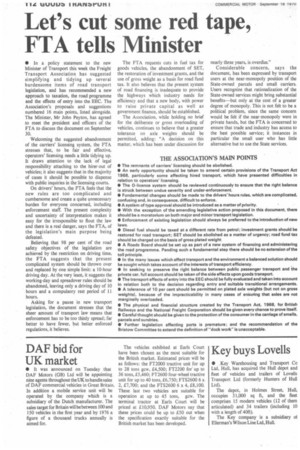Let's cut some red tape, FTA tells Minister
Page 114

If you've noticed an error in this article please click here to report it so we can fix it.
• In a policy statement to the new Minister of Transport this week the Freight Transport Association has suggested simplifying and tidying up several burdensome items of road transport legislation, and has recommended a new approach to taxation, the road programme and the effects of entry into the EEC. The Association's proposals and suggestions numbered 16 main points, listed alongside. The Minister, Mr John Peyton, has agreed to meet the president and officers of the FTA to discuss the document on September 30 Welcoming the suggested abandonment of the carriers' licensing system, the FTA stresses that, to be fair and effective, operators' licensing needs a little tidying up. It draws attention to the lack of legal responsibility attaching to the hirer-out of vehicles; it also suggests that in the majority of cases it should be possible to dispense with public inquiries in the licensing courts.
On drivers' hours, the FTA feels that the new rules are too complicated and cumbersome and create a quite unnecessary burden for everyone concerned, including enforcement staff. The present complexity and uncertainty of interpretation makes it easy for the irresponsible to flout the law and there is a real danger, says the FTA, of the legislation's main purpose being defeated.
Believing that 98 per cent of the road safety objectives of the legislation are achieved by the restriction on driving time, the FTA suggests that the present complicated system should be thrown over and replaced by one simple limit: a 10-hour driving day. At the very least, it suggests the working-day and spreadover rules should be abandoned, leaving only a driving day of 10 hours and a compulsory rest period of 11 hours.
Asking for a pause in new transport legislation, the document stresses that the sheer amount of transport law means that enforcement has to be too thinly spread; far better to have fewer, but better enforced regulations, it believes. The FTA requests cuts in fuel tax for goods vehicles, the abandonment of SET, the restoration of investment grants, and the use of gross weight as a basis for road fund tax. It also believes that the present system of road financing is inadequate to provide the highways which industry needs for• efficiency and that a new body, with power to raise private capital as well as government finance, should be established.
The Association, while holding no brief for the deliberate or gross overloading of vehicles, continues to believe that a greater tolerance on axle weights should be permitted, adding: "A decision on this matter, which has been under discussion for nearly three years, is overdue."
Considerable concern, says the document, has been expressed by transport users at the near-monopoly position of the State-owned parcels and small carriers. Users recognize that rationalization of the State-owned services might bring substantial benefits—but only at the cost of a greater degree of monopoly. This is not felt to be a political problem, since the same concern would be felt if the near-monopoly were in private hands, but the FTA is concerned to ensure that trade and industry has access to the best possible service; it instances in particular the small user who has little alternative but to use the State services.






























































































































































































































































































































































































